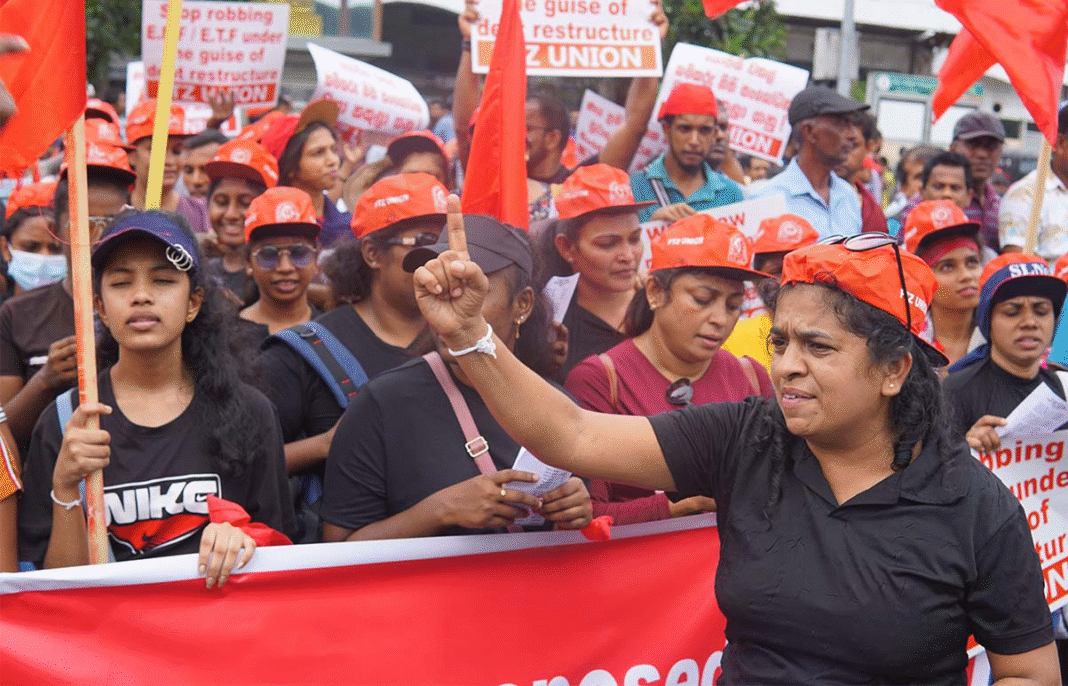(Sri Lanka brief/ 12 November 2025) Sri Lanka is once again at a crossroads in its labour policy. The Government’s ambitious plan to overhaul decades-old labour laws has sparked intense debate among trade unions, employers, and civil society. While officials tout the reforms as essential for economic competitiveness and foreign investment, unions warn of a systematic erosion of worker protections and democratic dialogue.
TU Requests Ignored
The Free Trade Zones and General Services Employees Union (FTZ and GSEU) has accused the Ministry of Labour of failing to honour its commitment to allow trade unions (TUs) to meet the expert committee drafting the reforms. Despite assurances at the National Labour Advisory Council (NLAC), no such engagement has occurred.
“Our view is that reforms should be deliberated through NLAC, not an isolated expert committee. We have no visibility on what is being drafted,” said FTZ and GSEU General Secretary Anton Marcus.
This exclusion has reignited fears that the Government is bypassing the tripartite process—a cornerstone of labour governance in Sri Lanka—by delegating reform to a 17-member panel of technocrats.
Proposed reforms
The proposed reforms aim to consolidate and modernise 14 existing labour laws into four key Bills covering:
- Trade Union regulation and collective bargaining
- Labour standards and employment contracts
- Occupational safety and health
- Termination of employment and severance benefits
Additional amendments will address night work for women, labour protection mechanisms, and employee insurance upon termination. A national policy on occupational safety and health is reportedly in its final stages, alongside a digitalisation drive to register workers in real time.
A Long Road of Unfinished Reforms
Sri Lanka’s labour law framework—fragmented across more than 40 statutes—dates back to colonial and early post-independence eras. Attempts to reform began in the late 1970s with the introduction of open economy policies, but successive governments avoided sweeping changes due to political resistance and union pressure.
The current push follows decades of partial, unsystematic amendments and comes amid an IMF-backed economic stabilisation programme. Critics argue that reforms are being rushed under the guise of attracting investment, echoing past failures where economic liberalisation deepened inequality without delivering sustained growth.
Union Concerns: Control and Compliance
Trade unions fear that the reforms will:
- Restrict the right to strike by requiring secret ballots supervised by Labour Department officials.
- Raise thresholds for union registration, potentially marginalising smaller unions.
- Dilute protections against unfair dismissal and reduce leave entitlements.
- Enable extended work shifts beyond the traditional eight-hour day.
Global union federations have condemned the draft as violating international labour standards, warning that it could dismantle decades of hard-won rights.
Economic Imperatives vs Social Protections
Proponents argue that outdated labour laws hinder job creation and foreign investment. The Government claims the reforms will:
- Simplify compliance for businesses.
- Introduce flexibility for modern work arrangements, including remote work.
- Align Sri Lanka with global standards on occupational safety and gender equality.
However, unions and rights groups counter that these changes prioritise investor confidence over worker welfare, risking a race to the bottom in labour standards. Amnesty International and other organisations have urged the Government to halt the process until genuine consultations occur.
Political and Social Implications
The timing of these reforms—amid economic hardship and rising living costs—has amplified tensions. For the Government, success could signal commitment to structural reform and fiscal discipline, strengthening its hand with international lenders. For workers, however, the stakes are existential: job security, bargaining power, and social protections are on the line.
Failure to manage this transition inclusively risks triggering industrial unrest and undermining Sri Lanka’s bid to retain trade concessions like the EU’s GSP+, which hinge on compliance with labour rights.
The Road Ahead
The Labour Ministry insists that stakeholder consultations will follow once the committee finalises its draft. Yet, with trust eroding and unions mobilising, the question remains: can Sri Lanka modernise its labour laws without sacrificing the principles of social dialogue and equity?
Key Takeaways
- Four Bills will replace 14 existing laws, covering unions, labour, safety, and termination.
- Digitalisation and OSH policy signal modernisation, but union rights may shrink.
- Economic rationale: attract investment and streamline compliance.
- Political risk: reforms seen as IMF-driven could spark protests and damage global reputation.
©SLB
